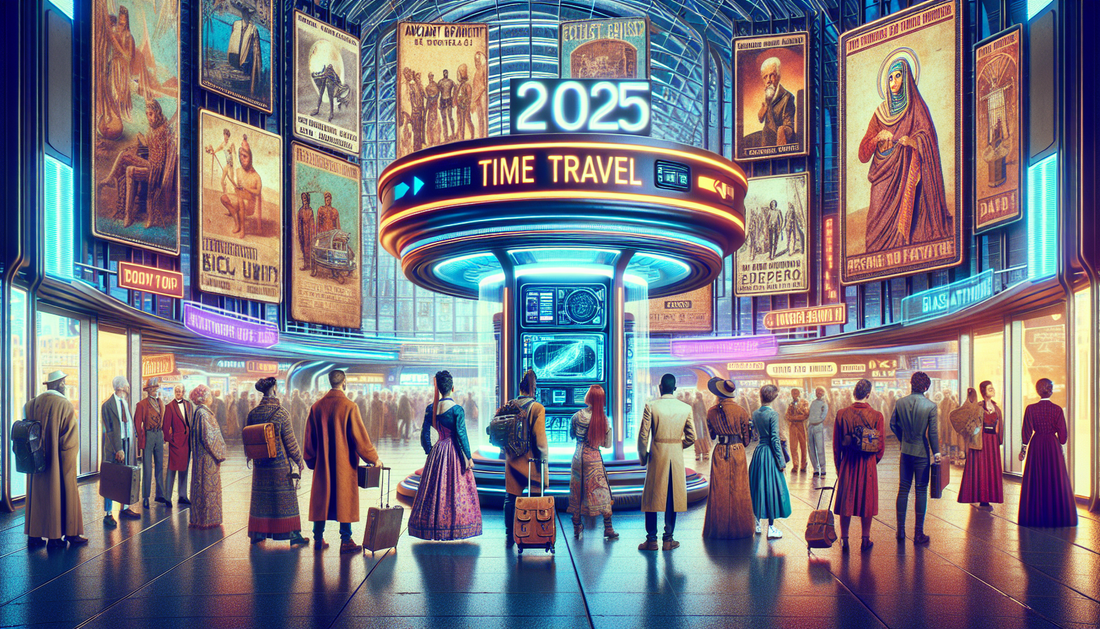
Discovering the Past: Travel Trends in 2025's Time Tourism
WonderLust3.6 RecipesShare
Time tourism is shaping up to be the most exciting travel trend in 2025, allowing history enthusiasts to explore historical eras firsthand. This innovative travel experience gives individuals a chance to witness pivotal moments and immerse themselves in the cultural nuances of different ages.
- Experience the grandeur of Ancient Egypt 🇪🇬, reliving the construction of the pyramids.
- Witness the Renaissance unfold in Florence, Italy 🇮🇹, meeting legendary artists like Michelangelo and Leonardo da Vinci.
- Immerse in the vibrancy of the Roaring Twenties in New York City 🇺🇸, dancing the Charleston and attending jazz clubs.
- Time tours follow strict schedules with a maximum duration of 48 hours per era to prevent historical disruptions.
- Conducted by licensed operators such as ChronoTravel and TimeVoyage, ensuring safety and historical integrity.
- Utilizes cutting-edge time-bending technology developed by Temporal Innovations, facilitating seamless journeys without affecting the current timeline.
- Strict policies in place banning interaction with historical events to preserve authenticity and prevent time paradoxes.
Embrace the past like never before with 2025's time tourism, offering a thrilling and educational journey through history! 🚀📜
As we step into the year 2025, a fascinating trend is captivating the imagination of travelers worldwide: time tourism to the past. Instead of jet-setting to exotic modern locales, an increasing number of globetrotters are opting to explore the annals of history. This surprising twist in travel trends sheds light on a collective yearning to reconnect with our roots and glean insights from bygone eras. So, what fuels this newfound enthusiasm for time-travel vacations, and what destinations are proving irresistible to history buffs?
Several factors are driving this trend. A significant one is technological advancements, allowing us to experience the past in ways previous generations could only dream of. Augmented and virtual reality applications have revolutionized how we interact with history, offering immersive experiences that bring eras long gone vividly to life. From walking the bustling streets of ancient Rome to attending a live re-enactment of the signing of the U.S. Declaration of Independence, the boundaries of time tourism are being continually stretched.
World leaders in creating these immersive experiences include TimeTravel Co., a pioneer in the field. Their destinations span several historical epochs and geographical locations. Clients can explore Egypt during the time of pharaohs or wander the battlefields of medieval Europe. As interest surges, they are constantly expanding their portfolio, catering to niches like tribal and indigenous cultures as well.
Rooted in History: Exploring Iconic Destinations
The world is dotted with remnants of the past, many of which are now popular destinations on the time-travel itinerary. Athens, Greece remains a perennial favorite. With its rich tapestry of classical civilization interwoven with present-day Mediterranean flair, Athens offers a unique window into ancient world politics, art, and philosophy. Visitors can now interact with Plato or witness the original Olympic Games thanks to cutting-edge recreations.
Similarly, Egypt captivates with its wonders. The Pyramids of Giza, standing for millennia, take tourists back to an era of divine pharaohs and monumental architectural ambition. A visit is incomplete without an authentic Egyptian feast prepared by local chefs who share age-old recipes and techniques passed down from generations. Egypt’s appeal has extended to tech-savvy adventurers eager to experience its celebrated history through authentic, dynamic storytelling.
Chronological Exploration for Tourists
For those looking to experience significant historical timelines, specialized tour packages are available. One particularly notable journey starts in the Renaissance era, delving into the flourishing art and science of the time. Moving seamlessly through periods, tourists can trace the evolution of Western society with stops at key historical milestones including Enlightenment Europe, the Industrial Revolution, and the bustling 1920s.
A remarkable case is the "Parisian 1920s Experience," which transports guests to post-war Paris. Here, artists and writers collaged dreams of a progressive future amidst jazz-filled nights. The package includes a stay in authentic 1920s accommodations, jazz club soirees, and even encounters with iconic figures like Hemingway and Picasso, brought to life through virtual renderings and cutting-edge interpretations.
Cultural Perspectives on Time Travel Tourism
The opportunity to learn from historical societies offers rich educational benefits. As people strive to understand the underlying causes of events, be they wars or cultural evolutions, historical tourism provides a dynamic means of learning. Schools and universities are incorporating such experiences into curricula, recognizing their potential to vividly teach history’s lessons.
A notable initiative is the "Interactive History Program" launched by various educational institutes worldwide. Participating students integrate VR-based travel into their history education, embarking on curated virtual journeys that complement classroom learning. This trend not only makes history engaging but highly memorable, cementing nuanced understandings of various events and their implications.
Preserving History for Future Generations
While these experiences are undoubtedly captivating, the ethical dimension of time tourism seeks to underscore the importance of preserving each site. Stakeholders are committed to ensuring that local cultures and landmarks remain respected and protected. Collaborations between technology firms and local authorities aim to honor native traditions while offering engaging, informative experiences.
By striking this balance, time-travel advocates hope to set a precedent for sustainable tourism. This involves fostering an appreciation for cultural heritage and encouraging responsible engagement with the past. Future travelers might find a blend of digital and physical preservation efforts, propelling an ethical approach to exploring history.
The trend of traveling through time, visiting the yesteryears of human civilization, continues to enrapture. As technology advances, offering deeper insights and greater authenticity in these experiences, it's easy to see why immersing oneself in history is becoming the ultimate way to travel in 2025. By mining the past, we may very well unearth future paths yet untrodden.











